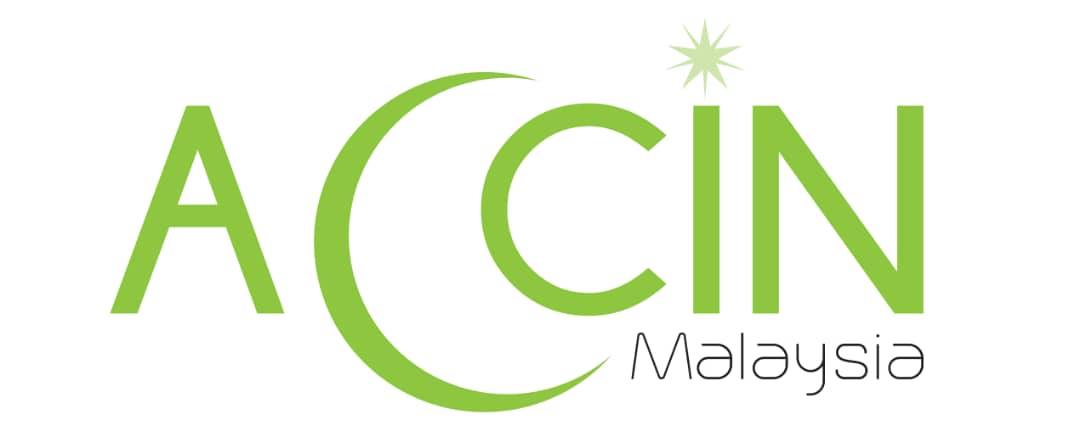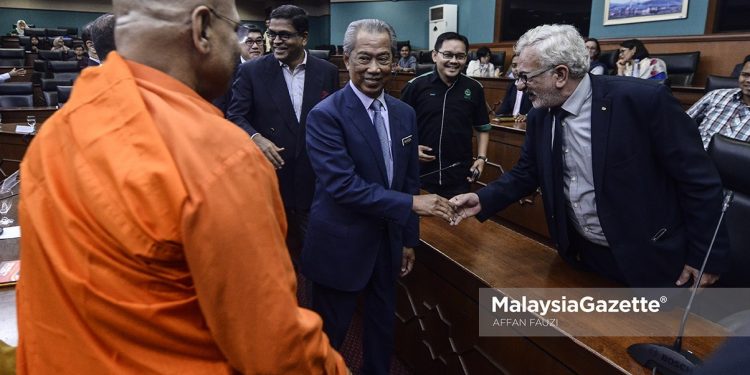OFFICIATED BY YB TAN SRI DATO HAJI MUHYIDDIN YASSIN, MINISTER OF
HOME AFFAIRS, MALAYSIA
VENUE: SENATE HALL, INTERNATIONAL ISLAMIC UNIVERSITY MALAYSIA
DATE: 26TH AUGUST 2019
ORGANIZERS: IIUM AND ACCIN
CO-ORGANIZERS: ANCOM, ABIM, MAPIM AND IKRAM
We, the undersigned organisations wish to affirm the fundamental rights of every human being to the right to life and the freedom of religion and
belief. This affirmation is recognised in the charters, declarations and
covenants of the international community. Specifically, we affirm Article
6.3 of the Asian Human Rights Charter that states “the freedom of religion
and conscience is particularly important in Asia where most people are
deeply religious; many find their primary identity in religion”. At the same
time, we are also cognizant of the sensitivities and security dynamics
involving our own multicultural society, especially with the prominence of
identity politics in the world today. We strongly affirm Malaysia’s Article 3
that provides Islam as the religion of the country while Article 11 also
provides for the freedom of religion in the Federal Constitution, that they
may be practiced in peace and harmony.
Therefore it is crucial that we reflect upon Malaysia’s relatively
uninterrupted periods of stability, peace and harmony these past six
decades. We need to continue to identify the common civilizational
values that we have in our religions and how they intersect within the
constitutional framework and how they can be educated, implemented
and lived in our state and nation building concepts and practices for the
present and future generations, in order for Malaysia to thrive, especially
in preventing and countering violent extremism.
IIUM, ACCIN, ANCOM, MAPIM, ABIM and IKRAM are ever willing to
continue organizing and supporting future seminar and activities related
to this theme as proof of our commitment. We would like to express our
sincere appreciation and gratitude to Yang Berhormat Tan Sri Dato’ Haji
Muhyiddin bin Haji Muhammad Yassin, Minister of Home Affairs of Malaysia and the Ministry for their continuous efforts to ensure the security of this great country of ours. May the blessings and mercy of Allah SWT be upon us all in Malaysia.
In relation to the concluded international seminar, we have agreed on
the following:
(A) RESOLUTION ON THE ESTABLISHMENT OF MALAYSIA’S NATIONAL
ACTION PLAN (NAP) FOR PCVE
(1) Recall the decisions of the United Nations Secretary General having
released a Plan of action to Prevent Violent Extremism (PVE) in response to the fourth review of the Global CounterTerrorism Strategy (a/RES/68/276), Security Council resolution 2178 (2014) The plan, recommends that: “each Member State should consider developing a national plan of action (emphasis added) to prevent violent extremism which sets national priorities for addressing the local drivers of violent extremism and complements national counter-terrorism strategies where they already exist.” The UN further recommends that National Action Plans be firmly grounded in human rights, developed in a multi-disciplinary manner, promote respect for the principle of equality before the law, address the issue of foreign terrorist fighters, and are aligned with the Sustainable Development Goals (SDGs) and 2030 agenda.
Recalling the Security Council resolution 2250 (2015) urges States “to
consider ways to increase inclusive representation of youth in decision making at all levels in local, national, regional and international institutions
and mechanisms for the prevention and resolution of conflict, including
institutions and mechanisms to counter violent extremism”.
Recalling the Security Council resolution 2242 (2015) and 2250 (2015) urge
member states and the United Nations system “to ensure the participation
and leadership of women and women’s organizations in developing
strategies to counter terrorism and violent extremism.”
(2) Advocate the formation of a coordinating body i.e. a secretariat, to
facilitate the National Action Plan (NAP) for Preventing and Countering Violent Extremism (PCVE) under the purview of the Ministry of Home Affairs.
This is to consolidate government resources towards and coordinate
actionable response towards PCVE issues and to also involve other
stakeholders and expertise from educational, civil society organizations
and the private sector. As it is, a survey of existing PCVE programmes
across various ministries and agencies e.g. MOHA, MYS, MOE, E8 – RMP,
the Department of National Unity and Integration under the Prime
Minister’s Department indicates that there are significant efforts at
engagement and capacity building for PCVE. However, there are also
overlapping and duplication of efforts and responsibilities of these
different government agencies which may prevent the efficient, effective
and cost-efficient enforcement of policies. By having a national
secretariat, we can better achieve the optimization of resources and best
practices.
(3) Advocate the development of a PCVE programme package for
Malaysian youth for national implementation. This will be ascertained
through a pilot study and identification of existing best practices across government ministries and agencies.
The principles of public health provide a useful framework for PCVE
utilising capacity building especially in terms of research, collaboration,
advocacy and engagement as part of more general nationbuilding
efforts and also target segmentation of those considered to be at risk of
radicalization and violence. By rigorously understanding the causes and
consequenses of violent extremism and terrorism via research and
instrumentation, we can create a more general but relevant primary
prevention programmes, policy interventions and advocacy; and a more
focused countering violent extermism programme as well.
The public health approach to the prevention of violent extremism seeks
to improve the health and safety of all individuals. By definition, public
health aims to provide the maximum benefit for the largest number of
people. Programmes for the primary prevention of violent extremism
based on the public health approach can be designed to expose a
broad segment of the population (in this case the youth) to prevention
measures. This can be done via the development of educational
programs targeted to the youth and advance the cause of youth
empowerment as beneficiaries and partners through academic and nonacademic programs and activities in and out of institutions of education.
(4) Recommend that outmoded aspects of PCVE require reform and
expansion in the so called post-ISIS period, by giving focus on the threat
of FRE (Far Right Extremism) and other religious and ideological radicalism
and the dynamic of their exchanges intra and between communities that
threaten local and global peace.
(5) Ensure accessibility and facilitation for research on PCVE related topics of PCVE via the National Action Plan (NAP) among different stakeholders, for example, by having free census data at village/district level from Jabatan Perangkaan Malaysia to local institute/laboratory/researcher for extensive statistical analysis to simulate a predictive model of vulnerable youth.
(6) Development of specific research ethical guidelines for PCVE and
Counter-Terrorism studies and its implementation by the relevant ethics
review committee for human subjects approval boards to ensure
stakeholder protection.
(7) Benevolent approach of the State in responding to the primary
identified drivers of violent extremism. States should undertake action that
addresses development, good governance, human rights and humanitarian concerns, whilst also strengthening the rule of law, repealing discriminatory legislation and implementing policies and laws that combat
discrimination, marginalisation and exclusion.
(B) RESOLUTION ON RELIGION AND RELIGIOUS VALUES IN PCVE
(8) Identify religious conservatism as distinct from extremism but becomes extremism when the narrative within a certain conservative group is dominated by hate. This would necessitate on the part of researchers and practitioners to develop instruments and means in order to identify vulnerable or communities at risk to radicalization and recruitment. This would then be generalised and approached through a PVE and nationbuilding approach; while targetted segments of society would then be specified and approached through more specific CVE programmes.
(9) Proactive engagement with those identified as harbouring extreme
religious ideologies and also those that actually plan to act upon their
extreme ideologies as an intervention strategy in PCVE and not
necessarily relying on reactionary and legal security mechanisms and
processes of the State.
(10) Recommends a platform under the NAP for intra and inter-religious discourse to be held between influencers and authorities of different groups consisting of religious leaders, scholars, civil soceity etc. as part of capacity building and as a panel of advisors to refine the evolving
narratives attached with extremism as well as the relevant development
of its prevention and counter-narratives.
(11) Emphasise that part of the preventive and counter-messaging
strategy would also include an inclusive understanding of the layers
identity politics – language; culture; religion; colonial history and legacy; nationstates and civilization through shared events and educational engagement, therefore providing access to the narratives and knowledge of different communities. This can be done by:
i. Encouraging civilizational identities of Southeast Asian to engage with each other while educating on the dangers of religious fascism.
ii. The need for Christians including Malaysian Christians to challenge the extreme ideology of “Christian Zionism” and to support moderate voices. This can be done through educational engagement by having tours or discourses for the Malaysian Christian community conducted by Palestanians to stress on the deprivation of their human rights and
facilitating understanding through the empathetic approach.
iii. Enforcement of Malaysian Penal Code Section 298A with regards to
ensuring religious harmony in relation to prejudicial and insensitive
propagation or activities of local and external groups or civil societies
after extensive investigation and fact finding.
iv. Adopting the principle of constructive advocacy for the plight and just treatment of the Uighurs, Palestinians, Kashmiri and Rohingya
communities, or other marginalised communities regardless of religious
identity. There has to be an earnest effort to address the drivers of violent
extremism in its proper context between State and society, for example,
to understand movements for civil rights, autonomy or self-determination
and the degree of State response to such demands.
(12) Leverage on religion and religious values as the bastion against
violent extremism. Despite religion being a complicated topic, we must
pay special attention to handling the intersection between identity politics
– especially it’s manifestations of racism, religious fascism and violent
extremism. At the same time, we should also be aware that religions as a
primordial and mainstream identity of its adherents contain the very
values that can be used effectively as foundational elements of nation
building and civilizational development at the expense of violent
extremism. At the same time, Islam is the official religion of the Federation;
it’s fundamental values on harmonious co-existence and the rejection of
extremism through the values of respect and rahmatan lil alamin is a
guiding principle.
(13) Emphasize the responsibility of religious leaders in educating their followers on the need to live in harmony and avoid extremist factions to influence the masses.
(14) While is it is a well known fact that Islam as the religion of the
federation is well regulated by various state and federal bodies, we must
also consider the monitoring of other religions, be it temple, church and
other places of worship to ensure the hate speech and extremism is not
preached.
(15) Demand responsibility and accountability of mass media and social media platforms that generate Islamophobia; and other partisan and ideological echo chambers, which normalises the narrative that
associates Muslims or other religions with violence and terrorism in toto.
26th of August 2019/25 Dzul Hijjah 1440
Signed and Acknowledged by:
- International Islamic University Malaysia (IIUM)
- Allied Coordinating Committee of Islamic NGOs (ACCIN)
- Association of NexGen Christians of Malaysia (ANCOM)
- Muslim Youth Movement of Malaysia (ABIM)
- Majlis Perundingan Islam Malaysia (MAPIM)
- Pertubuhan Ikram Malaysia (IKRAM)



Gambar Kredit: Malaysia Gazette









